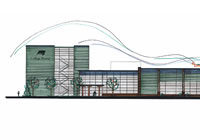
The number of skilled workers being trained by Collège Boréal in Timmins will jump exponentially after an $11.5 million campus in the city is completed next year.Construction on the 42,000-square foot facility is due to start in May 2008 and is to be finished in August 2009, just in time for the 2009-2010 school year. It will be located next door to École Secondaire Catholique Thériault, the largest French-language high school in Ontario.There are currently 100 students in Timmins attending classes in a small, rented building in the city’s downtown core. The college offers programs for heavy equipment mechanics and millwrights, as well as courses for students pursuing careers in health care and other fields.
After the new campus is built, the student population is expected to grow to 500. Existing programs will expand and new programs such as carpentry, plumbing and refrigeration, air conditioning and heating will be introduced.
Collège Boréal currently has seven campuses across the province offering full-time programs, as well as 17 access centres where employment assistance and part-time education is provided.
There is a shortage of skilled workers in Timmins, especially in the mining industry, so the extra space for students is needed, said Dan Giroux, vice-president of Les Entreprises Boréal.
With the forestry industry struggling, there’s also a need to re-train forestry workers for the booming mining industry.
As well, the francophone population in the city sits at 50 per cent, and students want to learn in their mother tongue, he said.
In the past, Timmins businesses have been generous in allowing Collège Boréal to train students in their industrial shops, but having those resources available on campus will be better, said Giroux.
“When you’re trying to train a heavy equipment mechanic out of a 20 by 20 classroom, it’s quite the challenge. The facilities are definitely an issue. There’s also no campus life,” he said.
“Although the faculty do a tremendous amount of work and try to have partners within industry to bring the students to their shops, from a student perspective, it’s kind of tough when you see an older, smaller facility where you can’t get the equipment within the campus to do the training.”
Much like at the college’s Sudbury campus, which opened in 1995, students attending the new Timmins campus will have access to state-of-the-art equipment in their classrooms.
Giroux and his colleagues have been working to have a new campus built in Timmins since 2002. The province is providing $7.5 million for the project, and the federal government is providing the other $4 million.
There are plans to add another 35,000 square feet onto the campus in three years, bringing the total area to 77,000 square feet. Giroux is unsure of how much this would cost given rising building costs.
Being located next to a large French high school will be a huge benefit to the college, he said.
“We’re always trying to attract high school students to continue on with their education, and having one right next door will help. There are a lot of partnerships between high schools and the college system,” he said.
“We know statistically that further education is great for the economy and for students.”


